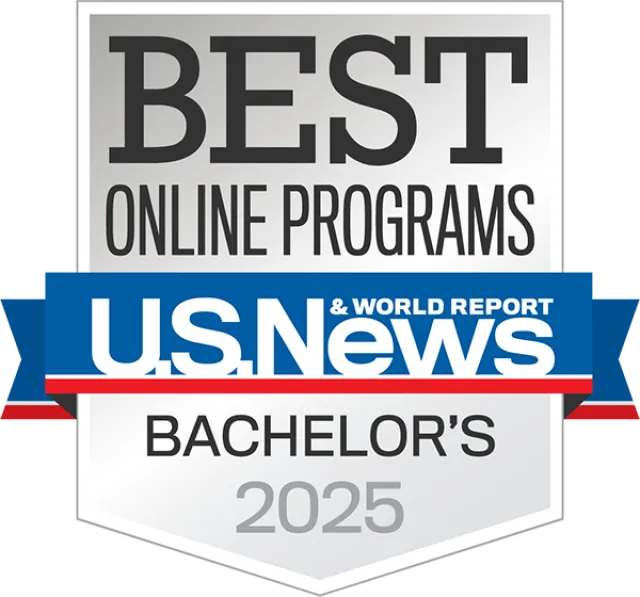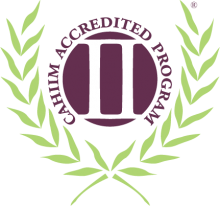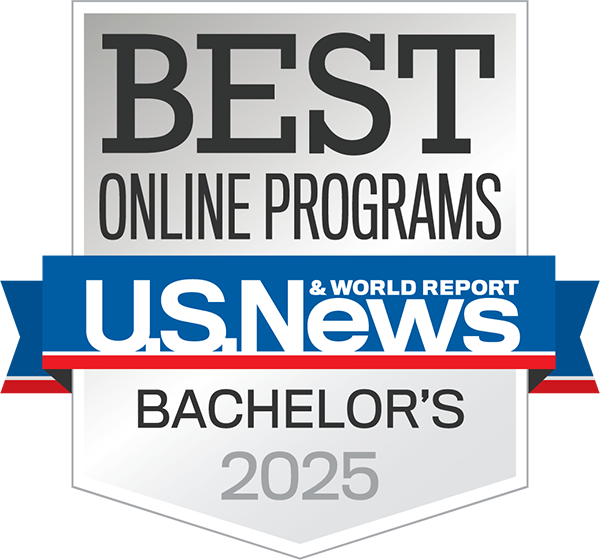Advance your healthcare career with a bachelor’s degree
| Accreditation | CAHIIM accredited,✝ Accredited by the Higher Learning Commission |
|---|---|
| Transfer credit | Transfer up to 93 approved credits |
| Format | 100% online classes, two 90-hour internships completed in person within an approved facility |
| Certification | Preparation for RHIA certification |
| QuickPaths | Transfer credit, stackable credentials, and adaptive learning technology build a faster pathway to a higher education with Herzing University |
Learn More Today!

Ranked by U.S. News & World Report as one of the best online bachelor's programs in 2025
Overview: Bachelor of Science in HIM
The Bachelor of Science in Health Information Management degree is a 124-credit undergraduate program which prepares you for a career in health information technology and management. The CAHIIM-accredited1 degree program provides students with fundamental knowledge and skills in information systems, health sciences, data management, coding, and more.

Career-focused curriculum
Discover the crucial knowledge and skills required to succeed in your work and build a foundation for continued career growth.
Flexible schedule
You can take classes during the day or in the evening. We work hard to help you maintain school-life balance, striving to be as flexible as possible for busy non-traditional students.
Virtual services
Access to extensive virtual services, including academic advising, tutoring, support services, technical support and library services.
Lifelong support
We support your ongoing career advancement by providing comprehensive, personalized student services with lifelong career coaching.
Rolling admissions
No application deadlines to worry about. Apply when you’re ready and prepare to get started soon.
Health Information Management bachelor’s degree classes & curriculum details
Graduates of the bachelor program with a bachelor in health information management will learn the basics of coding, health sciences and general education, including business, accounting and management skills. You’ll discover how to apply these specifically in the area of medical records and health information documentation.
Graduates of this program are qualified to take AHIMA’s Registered Health Information Administrator (RHIA) certification exam.
All classes are delivered online with one required capstone course or internship.
| Program | Months i | Credit |
|---|---|---|
| Bachelor of Science in Health Information Management | 36 | 124 |
iAverage number of months for students to complete program
Program availability varies by location
Required Management Core Courses
All courses, 24.00 semester credit hours, are required.
Or BU 502 - Leadership and Team Dynamics Semester Credit Hours: 3.00
Or BU 631 - Project Management for Business Leaders Semester Credit Hours: 3.00
Required Courses in Health Information Management Core
All courses, 45.00 semester credit hours, are required.
Required Anatomy and Physiology Courses
All courses, ◊8.00 semester credit hours, are required. (3.00 of these credit hours satisfies Science General Education Requirement).
Required Internship Experience
4.00 semester credit hours are required.
* Online students in some states may not be allowed to take this internship due to state restrictions.
** Enrollment in a student readiness training is required two terms prior to internship course. Successful completion of traini ng is required prior to internship course enrollment.
Elective Courses
A minimum of 8.00 semester credit hours is required. Students may take any healthcare or health information management, business management, or human resources course. At least 3.00 semester credit hours must be at the 300- or 400-level.
Dual Credit Courses
Eligible students can replace up to 6.00 semester credit hours of the core program requirements with approved dual credit graduate level coursework. A total of 12.00 graduate semester credit hours can be taken throughout the student's program. Graduate Program Applicable Dual Credit Courses Master of Business Administration Master of Business Administration in Business Analytics Master of Business Administration in Healthcare Management Master of Business Administration in Project Management BU 502 Leadership and Team Dynamics BU 631 Project Management for Business Leaders
Required Courses in General Education
Students enrolled in this bachelor's degree must complete a minimum of 36.00 semester credit hours in general education (◊ includes 3.0 credit hours from Anatomy and Physiology listed in above required) distributed among the following disciplines. Refer to the General Education section of the catalog for specific information about courses within each discipline. 12.00 Semester Credit Hours in Communications 9.00 Semester Credit Hours in Humanities (must include 3 semester credit hours of cultural diversity) 6.00 Semester Credit Hours in Mathematics 6.00 Semester Credit Hours in Social and Behavioral Sciences ◊ Science Semester Credit Hours are satisfied through Anatomy and Physiology requirement listed above.
Personal and Professional Development Courses
2.00 semester credit hours are required.
Save time and money by earning dual credit
Students in Herzing University's Healthcare Administration bachelor’s degree program can get a head start on earning a Master of Business Administration (MBA).
Qualifying students can take up to 12 graduate credits while still an undergraduate and apply these credits toward both their BS and MBA degrees.
Tuition & Cost
Tuition & Cost
The cost of tuition for the Bachelor of Science in Health Information Management program is $530 per credit.
You can potentially earn even greater savings by transferring credit from prior college coursework, applying for financial aid, or potential partnership opportunities through your employer.
Our goal is your career advancement. That's why we are always working to improve our curriculum and processes to make our program as affordable as possible while preparing you best for success in your work.
Scholarships & Financial Aid
You may be eligible for multiple scholarships and grants, both through Herzing University and several national scholarship websites.
Military/Veteran Discounts
Veterans, Active Duty U.S. Servicemembers, and spouses may qualify for a 10% tuition discount or tuition reduction to $250 per credit.
Waived Enrollment Fee
Discover the educational pathway designed to maximize your career potential. Reach for greater heights with Herzing University.



HIM bachelor’s degree program enrollment requirements
Prerequisites to enroll in the Herzing University Health Information Management bachelor’s degree program include:
- Completed high school diploma, GED or equivalent
- Meet and interview with a Herzing University admissions advisor
- Complete an enrollment application
With Herzing University, advancing your career in health information management IS possible. As your lifelong learning partner, we’re here to help you reach your highest career goals.
Accreditation & Recognition
Our accredited & recognized online school
We strive to earn rank as one of the top private, nonprofit universities in the United States. Just as you work every day to become the best version of yourself, so do we as a university.
We are proud to have attained institutional and programmatic accreditation in addition to industry recognition for our accomplishments helping students earn a college education and find career success.

Ranked by U.S. News & World Report among the best online bachelor’s degree programs in 2025.

✝The Health Information Management accreditor of Herzing University is the Commission on Accreditation for Health Informatics and Information Management Education (CAHIIM). The University’s accreditation for the Associate of Science degree and the Bachelor of Science degree in Health Information Management has been reaffirmed through 2030-2031. All inquiries about the program’s accreditation status should be directed by mail to CAHIIM, 200 East Randolph Street, Suite 5100, Chicago, IL, 60601; by phone at 312.235.3255; or by email at info@cahiim.org.
Herzing University is institutionally accredited by the Higher Learning Commission (hlcommission.org), a regional accreditation agency recognized by the U.S. Department of Education.
What jobs can I get with a bachelor’s degree in health information management?
Earn your bachelor’s degree in health information management and you’ll be well positioned to qualify for many job possibilities in health information and technology.
Job Outlook
As the demand for skilled healthcare professionals continues to grow, administrative support positions are expected to rise over the next decade.
According to the Bureau of Labor Statistics, employment of Medical and Health Services Managers is expected to rise 28% from 2022-2032, faster than the average across all U.S. occupations.*
Now is a great time to work towards becoming a health information manager and make your mark in the growing field of healthcare.
Potential health information management jobs include:
Description: Medical records technicians, also called medical coders or coding specialists, ensure that patient information is recorded and cataloged correctly. In addition to verifying patient records, they also analyze patient data to help improve patient care and cost structures. This job is ideal for those who are detail-oriented and have strong organizational skills.
The Bureau of Labor Statistics predicts that employment for medical records technicians will grow by as much as 7% from 2024-2034—faster than average for most occupations.
Learn more about what you need to do to become a medical records technician, including educational and certification requirements.
Average salary (US): $55,970 per year, $26.91 per hour (source: Bureau of Labor Statistics)*
Description: Medical and health services managers plan, direct and coordinate the day-to-day operations of a healthcare facility. The Bureau of Labor Statistics reports that healthcare organizations have a growing need for managers with knowledge of health information technology and informatics. They project 23% employment growth for medical and health services managers between 2024-2034.
Most medical and health services managers have a bachelor’s degree in health information management and administrative or clinical experience at a hospital or other healthcare facility. The BLS reports the average salary for medical services managers is $137,730 per year ($66.22 per hour).
Description: Management consultants help companies solve their complex business problems. A health information management consultant specializes in helping healthcare organizations with their HIM needs, such as implementing new medical records systems and processes.
The Bureau of Labor Statistics (BLS) predicts that employment for management consultants will grow 9% from 2024-2034. Much of this growth will be in the healthcare sector, as organizations look to cut costs and implement new technologies to manage patient records.
Management consultants earn an average salary of $114,710 per year ($55.15 per hour), according to the BLS.
Description: Patient information coordinators, also called health educators or patient navigators, help people manage their health information and understand their healthcare provider and insurance options. Patient coordinators must have exceptional communication skills and a thorough knowledge of medical terminology as well as health information technology.
Average salary: $71,700 per year, $34.47 per hour (source: Bureau of Labor Statistics)*
Job outlook: 5% increase from 2024-2034 (source: Bureau of Labor Statistics)*
Description: With experience, HIM professionals can advance to mid- and upper-level management roles, such as HIM director. The HIM director manages all operations and personnel in the HIM department and works with executive management to provide efficient and secure access to quality patient data. This position might also be called a Health Information Administrator or Manager.
Average salary: $137,730 per year, $66.22 per hour (source: Bureau of Labor Statistics)*
Job outlook: 23% increase from 2024-2034 (source: Bureau of Labor Statistics)*
How can I advance my career?
While earning a bachelor’s degree and continuing to earn experience will help you qualify for many different types of jobs, a master's degree may help you compete for upper-level healthcare management roles.
You may earn up to 12 dual credits to use towards an Master of Business Administration as part of the Herzing bachelor’s degree program.
Or leverage your existing skills and experience in health information into a Master of Science in Healthcare Administration degree program.

Faq
Frequently Asked Questions
Didn't find the answer to your question? Send us an inquiry and we will be happy to answer all your questions!
Finding your place and succeeding in your career depends on your strengths in relation to the skills needed in health information management, including:
- Analytical skills
- Attention to detail
- Communication and teamwork
- Technical skills
- Leadership skills
Because of the increased need for data-driven decision making and growth of information technology in healthcare, health information managers must be adept on the execution or managerial side of day-do-day tasks. Those strong on both sides can find great career success in HIM.
The primary difference is:
- Healthcare management refers to the practices and procedures involved with operating and supervising hospitals and other healthcare facilities.
- Health information management involves the collection, analysis, maintenance and security of a healthcare facility’s billing, research, quality improvement and credentialing.
Both fields combine high-level business and day-to-day functions of a healthcare environment to support the delivery of excellent patient care.
Discover more details about the difference between healthcare management vs. health information management.
You can make more than $190,000 at the highest positions in HIM medical and health services, according to data from the Bureau of Labor Statistics (BLS). Medical and health service managers reportedly earn an average salary of $137,730 per year ($66.22 per hour).*
It all depends on your level of degree attained, certifications and experience in HIM. The ladder is tall and educated prospects are in high demand. Read more about the average salary for health information management jobs typically requiring an associate's or bachelor's degree in HIM.
Yes! You can earn your degree in health information management online with Herzing University. Studying health information management online is a great way to learn new skills on your own schedule.
Given the increased demand in the industry, wide range of jobs you can pursue and the average salary you can earn, going back to school and earning your degree in HIM is definitely worth it. It’s a field with high growth potential and excellent career mobility.
With Herzing University you are never alone. It’s our goal to provide all students an affordable, career-driven education. Financial aid options include:
- Loan options – Federal & private
- Scholarships & grants
- VA / military benefits
- Other sources of financial aid
You can find an estimate for tuition and expenses by using the Herzing University tuition wizard.
Certification is not a requirement for all health information management professionals, but it will give you an advantage in finding the job of your choice.
Two credentials in particular – RHIA and RHIT – can help you get your first job or push your career in health information management to the next level. Read more about what health information management certification is right for you.
There are a few primary differences between medical billing and coding and health information management.
Those who work in medical billing and coding, who may be referred to as medical records specialists, play a key role in the healthcare revenue cycle, ensuring Electronic Medical Records (EMR) are assembled accurately and entered into health information systems properly. They communicate with healthcare staff, insurance companies, and patients to best represent services provided (coding) and secure payment for those services (billers).
Health Information Management professionals (sometimes referred to as Health Information Technology – HIT) are responsible for maintaining, analyzing, and optimizing these systems. Their role is more on the backend, emphasizing informatics and Information Technology (IT). These professionals create, manage, and analyze the systems billers and coders rely on to maintain the Electronic Health Record (EHR). They can also play a wider role in data analysis, management, protection, and administration of patient health information.
Registered Health Information Administration (RHIA)
Graduates of the Bachelor of Science in Health Information Management are eligible to take the Registered Health Information Administration (RHIA) exam through the American Health Information Management Association (AHIMA).
Registered Health Information Technician (RHIT)
Graduates of the Associate of Science in Health Information Management are eligible to take the Registered Health Information Technician (RHIT) exam through the American Health Information Management Association (AHIMA).
Eligibility:
Only those who successfully:
- Complete a bachelor's degree in a HIM program accredited by the Commission on Accreditation of Health Informatics and Information Management Education (CAHIIM) or are enrolled in their last term of study
OR - Graduate from a HIM program that is approved by a foreign association with which AHIMA has a reciprocity agreement.
The most important steps to become a medical records technician are getting the proper education in billing and coding or HIM and becoming certified.
You’ll be in a great position to qualify for entry-level positions and begin your new career path.
Program Finder
Bachelor of Science in Health Information Management
OnlineTo learn more about this program, click the Request Info button.
The Student Experience at Herzing
I decided to attend Herzing University because I wanted to further my education and be able to open myself up to more job opportunities.
Alicia Wright
Healthcare Student | Online CampusI did my research, and I really wanted to get into the medical field somehow. I read about Medical Billing and Coding, and it was the perfect fit!
Caleb Diaz
Healthcare Student"When you leave Herzing, it's clear that they want you to have the skills, confidence and integrity to make your field better."
Robin Hussey
Healthcare Student | Online CampusHerzing is a close-knit environment. You build a network of relationships and friendships that you can take with you anywhere and everywhere.
Jasmine Cadet
Healthcare Student | Atlanta CampusI wanted a degree program where I could learn more of the business side of healthcare and apply what I already knew from previous experience.
Delisa Rawlins
Healthcare Student | Orlando CampusI became even more driven to be the best version of myself, and I used the challenges I faced as stepping stones to success.
Quiana Mitchell
Healthcare Student | Akron CampusAccreditation & Disclosures
Herzing University is accredited by the Higher Learning Commission (hlcommission.org), an institutional accreditation agency recognized by the U.S. Department of Education.
View Herzing University Accreditation and Approvals
CAHIIM Program Outcomes
Bachelor of Science in Health Information Management
| Program | Graduation Rate | Employment Rate | Student Satisfaction Rate |
|---|---|---|---|
| Bachelor of Science in Health Information Management | 36% | 77% | 100% |
Note (1): Program Graduation Rate is the number of students who complete the program in no more than 150% of the stated program length. The graduation rate percentage represents cohorts who started in 2018-2019 and were scheduled to graduate within 150% of the stated program length in 2022-2023.
Note (2): Overall Program Employment Rate is based on students who graduated the program August 1, 2022 to July 31, 2023.
Note (3): Student Satisfaction Rate is based on students who completed the Herzing University Student Satisfaction Survey during August 1, 2022 to July 31, 2023.
* BLS pay estimates calculate the median annual wage for various occupations. Per the BLS the median wage for an occupation is: "The wage at which half of the workers in the occupation earned more than that amount, and half earned less. Median wage data are from the BLS Occupational Employment and Wage Statistics survey." Bureau of Labor Statistics (BLS), U.S. Department of Labor, Occupational Outlook Handbook 2024. BLS median wage estimates do not represent entry-level wages and/or salaries. Multiple factors, including prior experience, age, geographic market in which you want to work, and degree level and field, will affect career outcomes, including starting salary and earnings as an experienced employee. Herzing neither represents that its graduates will earn the median salaries calculated by BLS for a particular job nor guarantees that graduation from its program will result in a job, promotion, particular wage or salary, or other career growth.
Recent Blog Posts
Waived Enrollment Fee
Discover the educational pathway designed to maximize your career potential. Reach for greater heights with Herzing University.







